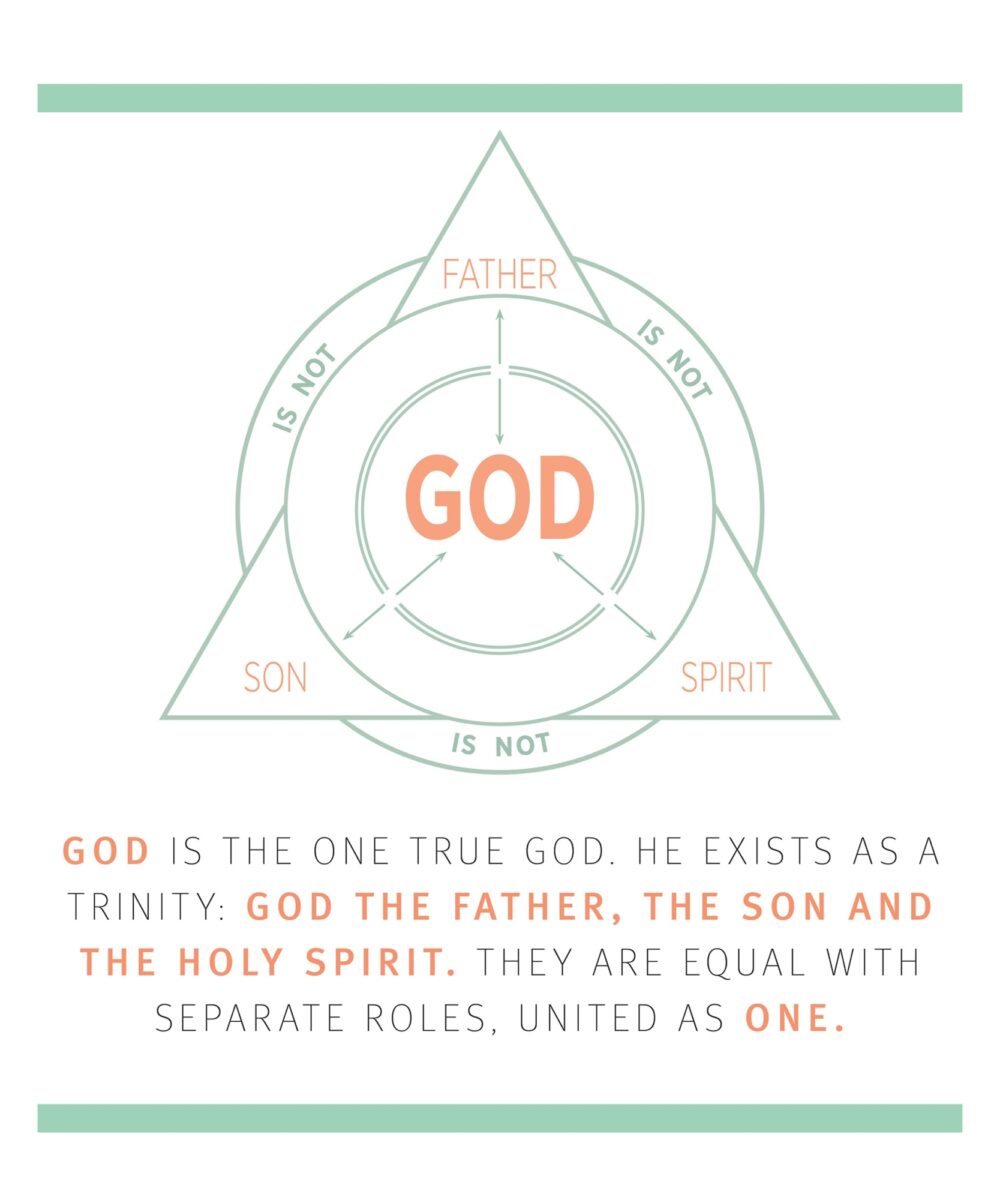
Departments
Faith

The Holy Trinity
Faith in God is about a relationship, not a religion. This makes knowing God central to a personal faith. “Who are you, God?” is the vital question the Bible answers in a surprising way. Throughout the Scriptures, god defines himself as God the Father, God the Son and God the Holy Spirit. Bible scholars call this mind-bending truth the Trinity.
The concept of the Trinity is one of the great mysteries of the Bible. Romans 11:34 says, “For who among us can know the mind of the Lord?” God’s character and what He is like are so enormous that we, with our limited minds, cannot comprehend Him.
The Bible is clear that God is three-in-one: God the Father, God the Son, and God the Holy Spirit (see Matthew 28:18–20). The three parts are separate personalities, often referred to as three persons since They are so individual. And yet They are together, They form one being: God.
We can try to explain the Trinity with analogies and illustrations, but even these come up short. Because God is so great, no illustration does Him justice.
For instance, look at an egg and its three separate but equal parts—yolk, white and shell. Each has its own identity and purpose, and yet all three make up something more. Take away one of the three parts, and it’s no longer an egg.
Now look at yourself. You probably have three names: a first name, a middle name and a last name. Standing alone, each of those three names represents you, but none of the three names alone defines you. Only all three names together can do that.
Who do you pray to? God the Father. In Matthew 6:6, Jesus says, “But when you pray, … pray to your Father, who is unseen.” Then Jesus told us how to pray, starting with the words, “Our Father in Heaven … ”
Here’s a look at the roles of each of the three coequal persons of God:
- God the Father’s role is to generate things. All things originate with Him and flow from Him. God the Father is equal with the Son and the Holy Spirit, but things start with Him. The Father sent both the Son (John 3:16–17) and Holy Spirit (John 14:26) into the world.
- God the Son’s role is to pay for our sins with His blood, which He did on the cross (Romans 5:9). The Son, Jesus, also acts as a lawyer for us before God, acting as a mediator between us and God (1 Timothy 2:5), and speaking “to the Father in our defense” (1 John 2:1).
- God the Holy Spirit has many roles. The Spirit helps us pray (Romans 8:26–27). He gives us new life (John 3:3–6). He is our Comforter and He helps us understand God’s Word (John 14:26). He lifts up Christ (John 15:26). He convicts us of sin (John 16:7-11). He helps us live holy lives (Romans 15:16). He gives us love, joy, peace, patience, kindness, goodness, faithfulness, gentleness and self-control (Galatians 5:22–23). He helps us share our faith (Acts 1:8). And He lives inside us (Romans 8:11).
Holy, Holy, Holy! Lord God Almighty! All Thy works shall praise thy name in earth and sky and sea; Holy, Holy, Holy! Merciful and Mighty! God in Three Persons, blessed Trinity!
God Reveals Himself
The idea that God exists as a Trinity, or Tri-unity, can be seen in the teachings of Jesus, but the word Trinity is never used in the Bible. Early church leaders used this word to represent and summarize the biblical truths that God revealed about Himself to mankind.
Instead of introducing this concept in one passage, the Trinity emerges like a tapestry image. This concept is woven into multiple passages, each reflecting a truth about God. Put these Scriptures together and you get a self-portrait painted by God.
The Trinity: A Primer
The doctrine of the Trinity answers these vital questions: What is God? Who is God?
These are among the foremost truths revealed in the Trinity:
- There is only one God.
- God eternally exists as three divine persons, Father, Son and Holy Spirit. Each person of the Trinity has His own will and can love, speak and act.
- Each of these divine persons, Father, Son and Holy Spirit, are fully God. They are coequal, coeternal, copowerful and exist simultaneously.
- Each person of the Trinity simultaneously represents all of God not just part of God.
- The Holy Spirit is a person, not a force.
The Holy Trinity Scripture Reference Guide
| Father | Son | Holy Spirit | |
|---|---|---|---|
| God | Grace to you and peace from God our Father and the Lord Jesus Christ. Philippians 1:2 |
And the Word became flesh and dwelt among us, and we have seen his glory, glory as of the only Son from the Father, full of grace and truth. John 1:14 |
But Peter said, “Ananias, why has Satan filled your heart to lie to the Holy Spirit … You have not lied to man but to God.” Acts 5:3–4 |
| Creator | But now, O Lord, you are our Father; we are the clay, and you are our potter; we are all the work of your hand. Isaiah 64:8 |
He is the image of the invisible God, the firstborn of all creation. For by him all things were created, in heaven and on earth … and in him all things hold together. Colossians 1:15–17 |
The Spirit of God has made me, and the breath of the Almighty gives me life. Job 33:4 |
| Eternal | Before the mountains were brought forth, or ever you had formed the earth and the world, from everlasting to everlasting you are God. Psalm 90:2 |
But you, O Bethlehem Ephrathah … from you shall come forth for me one who is to be ruler in Israel, whose coming forth is from of old, from ancient days. Micah 5:2 |
how much more will the blood of Christ, who through the eternal Spirit offered himself without blemish to God, purify our conscience. Hebrews 9:14 |
| Love | For God so loved the world, that he gave his only Son, that whoever believes in him should not perish but have eternal life. John 3:16 |
Husbands, love your wives, as Christ loved the church and gave himself up for her. Ephesians 5:25 |
I appeal to you, brothers, by our Lord Jesus Christ and by the love of the Spirit, to strive together with me in your prayers to God on my behalf. Romans 15:30 |
A Battle for Truth
The apostles accepted God as He revealed Himself to them in the Old Testament and in their experience on Pentecost (Acts 2:1–4). They accepted Him as the Father, Son and Holy Spirit. They saw little conflict that God the Father was their Savior (1 Timothy 1:1) as well as Jesus Christ (2 Timothy 2:10). They were comfortable that God as Father, Son and Holy Spirit were all involved in Creation (Genesis 1:1-2, Isaiah 64:8, Colossians 2:9, Genesis 1:2, Job 33:4).
The Trinity
Reading and wrestling with Scripture is the only true way to be convinced of the reality of God as One, expressed eternally as a Trinity (tri-unity) of three persons.
But the Gospel of Jesus Christ moved beyond Jerusalem and the earliest believers. Other cultures influenced by polytheism (many gods) and various philosophical systems encountered the Gospel. Their ideas often challenged the concept of one God as Father, Son and Holy Spirit. Church leaders spent almost 300 years refuting false concepts of God by carefully debating and refining church statements about God. They used God’s own revelation through the Holy Scriptures to create statements outlining correct teachings. These statements became known as creeds. Best known are The Apostles’ Creed and the Nicene Creed, which are both embraced by many churches today. Here’s part of the Nicene Creed:
I believe in one God,
the Father Almighty,
maker of heaven and earth,
and of all things visible and invisible;
And in one Lord Jesus Christ,
the only begotten Son of God,
begotten of his Father before all worlds,
God of God, Light of Light,
very God of very God,
begotten, not made,
being of one substance with the Father
And I believe in the Holy Ghost, the Lord
and Giver of Life,
who proceedeth from the Father [and the Son];
who with the Father and the Son together
is worshipped and glorified.

God is One
The Trinity isn’t some impersonal doctrine of little importance. It’s a key to unlocking fundamental aspects of faith, life and how our relationships work.
Love
The concept of love–true consistent, selfless, total love–originates among the three persons of the Trinity. Scripture states “God is love” (1 John 4:8). The Father, Son and Holy Spirit provide a perfect picture of love. The members of the Trinity honor, praise and love each of the other members of the Godhead (John 17:1, 4–5, John 16:14–15).
Submission
Our culture has the wrong idea of submission and, by extension, leadership. Humans assume someone taking leadership must be better, stronger, wiser or at least richer. And many leaders assume that it is within their prerogative to use, misuse or even abuse those “under” their authority. However, godly authority is different. The Trinity shows us that submission in a community of perfect love is different. The Son (Jesus) and the Holy Spirit have chosen to defer to the leadership and direction of God, the Father. This deference does not lessen the identities of the Son or the Holy Spirit. We are called to submit to one another (Ephesians 5:21).
Community
God knows perfect community among the three persons of the Trinity. Each member considers the interests of the others (Philippians 2:1–5). They deal with each other in perfect integrity. God calls us into community (John 14:23–24, JOHN 17:20–24, 1 John 1:3,6–7).
Resurrection
The hope that is in Christ was plain for all to see in His Resurrection. Each member of the trinity took HIs part in making the impossible possible. The Apostle Peter proclaimed the prime mover was God the Father (Acts 5:30). The Apostle Paul proclaimed it was the Spirit who “raised up Jesus from the dead” (Romans 8:11). And Jesus proclaimed He had power to give His life and “take it up again” (John 10:17–18). Likewise, we who seek a life with God beyond this world must rely on the full power of the Trinity for our salvation. Because of the Trinty we have a living hope through the resurrection (1 Peter 1:3).
We want to keep in touch.
Don’t miss out on the latest Life:Beautiful updates, promotions and news.








